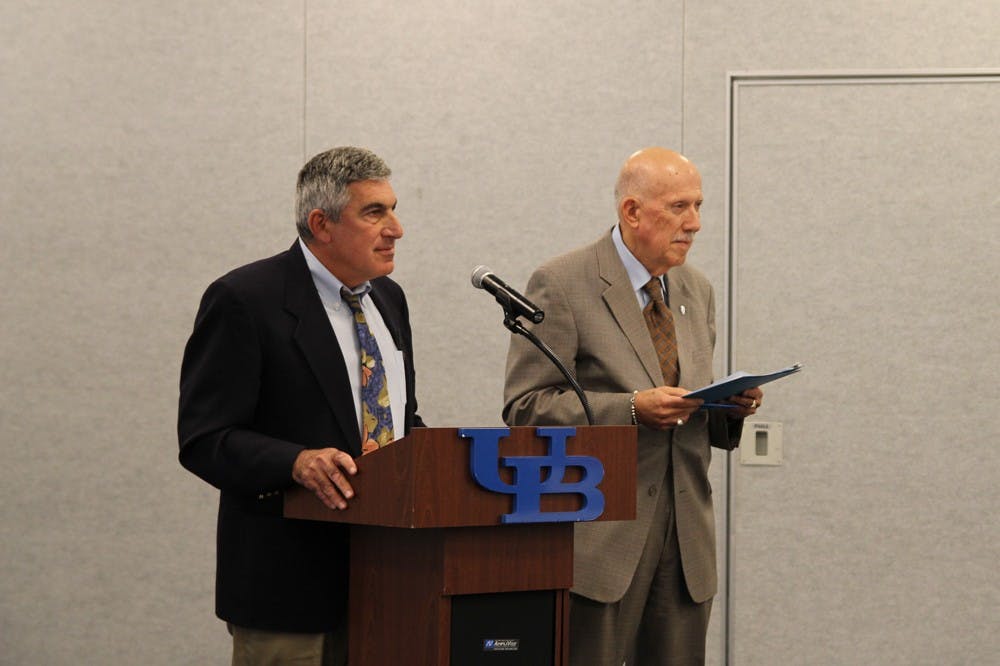Despite debating the topic in faculty meetings for an entire semester and forming a committee to draft a policy, UB may still not be regulating professors assigning self-published textbooks and accepting cash from their students when classes start next fall.
And, such as the common theme with the Faculty Senate, it will be because not enough faculty showed up to vote.
The Faculty Senate could have passed regulation on professors assigning their own textbooks on Tuesday, but the vote was not held because only 39 out of the required 44 voting members were in attendance. The Faculty Senate Executive Committee may decide to vote on the matter themselves on Wednesday in place of a full faculty vote. If not, the policy won’t be voted on until next semester
The executive committee drafted the policy and began discussing the issue after an article published in The Spectrum in November detailed UB’s lack of policy on professors assigning their own textbooks and accepting students’ money for the books in class. Both faculty and students have taken issue with professors assigning their own textbooks, citing ethical issues with professors profiting from students and accepting cash from students in the classroom.
“If you’re in a class taught by a professor, certainly you’ll want the best material and best education you can get but I have a problem with that professor mandating their own textbook and receiving a profit off of that,” said Michael Chaskes, a professor in the Department of Medicine.
Ezra Zubrow, who is stepping down as Senate Chair after this semester, said he was hoping the Senate could have quorum so the policy could be in place for the upcoming fall semester.
Low attendance at Senate meetings has been a reoccurring issue. The executive committee nearly voted on UB’s new decanal review policy themselves in March after the Senate did not have quorum, but the committee eventually gave the Senate another opportunity to vote. The Senate had quorum in its April meeting and passed the new decanal review policy.
Faculty in the past have voiced concerns that the executive committee’s voting on matters themselves may be violating the general body’s bylaws.
The proposed regulations, that were unable to be voted on, declared that faculty must allow students alternatives for buying the texts and that professors must justify the fee they charge students in comparison to other textbooks.
One of the largest issues that students and some faculty have raised was in regard to professors taking cash for textbooks inside the classrooms. The proposed policy declares that if professors assign their own textbooks, a third party has to collect and process the money.
The policy also urges “all campus administrators, faculties and libraries to explore ways to increase knowledge of the no-cost or low-cost textbook alternatives,” Zubrow said.
The Senate debated several amendments to the policy before realizing it did not have enough members to vote.
Chaskes proposed an amendment that would not allow faculty to receive royalties on the textbooks they assign unless they provide opportunities for no-cost reserve books or reserve electronics resources, or make a documented charitable contribution equal to the profits to a fund established by UB Libraries, UB Foundation or the Student Association.
After Chaskes proposed his amendment, the floor was open to questions and responses from other faculty members.
Jim Jensen, a civil engineering professor, said Chaskes’ amendment was “impractical” and he didn’t understand how it would be possible to trace royalty statements and calculate a number for the charitable contribution.
“You would get the royalty payments six months later and you don’t know who bought the books whether they were bought from the bookstore or from Amazon,” Jensen said.
Other faculty members expressed their concerns with Chaskes’ amendment and the overall policy but were unable to vote to make a final decision.
If the executive committee doesn’t come to a decision on Wednesday, the topic will not be revisited until the fall semester.
Gabriela Julia is the senior features editor and can be reached at news@ubspectrum.com





